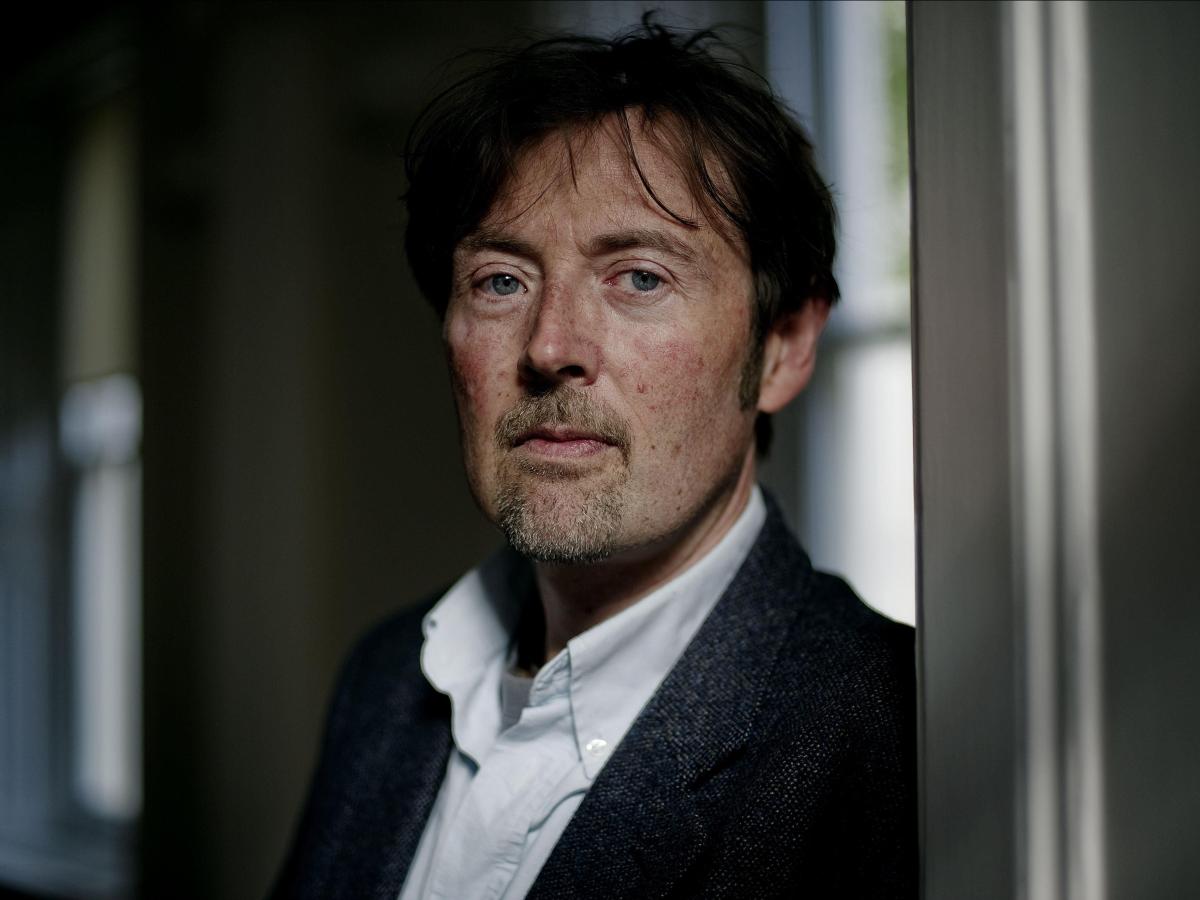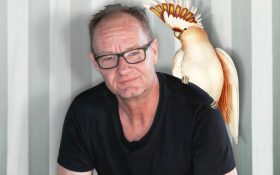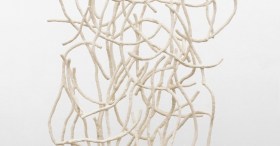Image: DBC Pierre via www.thewhitereview.org; photo by Sarah Lee.
For the first time slot of the morning, Ilsa took in the ‘Behind the Man’ session offering insights into the art of biography. Onstage were Madonna King, journalist-author of Hockey—not your average Joe, the first authorised biography of Treasurer Joe Hockey, and journalist-author Hamish McDonald, author of A War of Words, the man who talked 4000 Japanese into surrender, the extraordinary story of Charles Bavier, a European raised as a Japanese in the late 19th century who ended up working against the Japanese for western intelligence services.
The authors agreed on basic principles:
- Nothing in a biography should be ‘out of bounds’’ it should be ‘warts and all’.
- The biographer does not need to like his subject; McDonald had even spent some time courting the late North Korean ‘Dear Leader’ Kim Jong Il with bottles of premium Penfolds Grange wine, so great was his desire to write Kim’s biography.
- Biographers need to get right inside their subjects’ heads: the answer to the common question, ‘When do you stop researching and start writing?’ was, King said, ‘When you find you can go into a restaurant and order exactly the dinner that the subject of your biography would order for his or herself.’
The two authors worked within very different timelines, King belting out her Hockey biography within one year, working seven days a week, including Christmas Day, while McDonald took decades to complete his book, during which time the book became an ‘albatross’ around his neck, filling him with guilt.
Carol, meanwhile, attended a session on fairy tales, featuring Kate Forsyth and Danielle Wood in conversation with Delys Bird. Both are prolific writers are multiple award winners who have drawn on their love of the fantastic in their work. The trio spoke knowledgeably on the history of fairy stories and then went on to describe how they subvert them. This subversion, it seems, is just one twist in the long history of the genre. Fairy tales, it was agreed, are almost like living organisms, capable of adapting to the mores of any time and any place. They can serve as a vehicle for telling things that can’t be told in any other way. To a feminist, the traditional forms seem to speak of the repression of women by men, yet so often such tales are about women repressing each other, given the many tales of wicked witches imprison or enchant young girls.
Braving Dracula in his box, Ilsa ventured into the session featuring Man Booker Prize-winner (2003, Vernon God Little), one-time Australian and now European-Irish resident DBC Pierre, who has recently joined Penguin’s (Random House) innovative Hammer Films horror imprint with his spooky novella Breakfast with the Borgias. Tough, sepulchral-voiced Pierre, who has been there, done that, equates the intrinsic scariness of real life and indeed of real people with that of horror fiction. His protagonist is alone, isolated and dis-communicated (Internet-deprived etc) in a remote Essex guesthouse, amid swirling English fog… But writing doesn’t come easy for Pierre: ‘It’s a little like swimming the Atlantic in the dark…The best thing about writing a book is when you are not writing it.’ Of winning the Booker, he says, ‘The basis of all our errors is fluctuating self-esteem. I was overwhelmed. It put a monkey on my back for 10 years. It humbled me more than it made me a dickhead.’ Pierre recommends a pseudonym like his own (‘Dirty-But-Clean’ Pierre) as a useful cloak under which an author can cultivate objectivity and self-criticism.
Carol’s second session featured the literary journal, the Griffith Review. The latest edition, titled ‘Looking West’, investigates the idea of art and innovation on the periphery. The panellists, Brook Davis, Amanda Curtin and Peter Newman, spoke with chair Julianne Schultz about attitudes to Western Australia by both in-dwellers and outsiders. The idea of WA as being the Wild West, on the very borders of civilisation, is not dead, and it affects attitudes on both sides of the state borders. Some see WA as ‘the golden west’ a land of promise and plenty: others are more struck by the inevitable sense of isolation. The one thing all agreed on was the open and friendly atmosphere in the writing community of WA. Trying to break into any arts community interstate or overseas can be very difficult; here we welcome newcomers with open arms, and those newcomers often comment on the sense of excitement and newness that pervades the arts community in the west. As one comment from the audience put it, there is a sense of possibilities here in the West that does not seem to exist elsewhere, and Julianne Schultz commented that there is a feeling of synthesis in WA that is now starting to extend to indigenous history and culture.
Carol’s first foray after lunch on Day One was into the archetypal Hero’s Journey, as discussed by Joe Abercrombie and Rachael Craw with chair Ara Jansen. Both authors have recently released YA novels of the ‘quest’ variety, but their styles and approaches are very different. Abercrombie’s signature trope is a complete subversion of the brave and noble hero who suffers but never gives up and always does the right thing. Abercrombie’s ‘heroes’ are ordinary guys with ordinary failings. They learn to take the expedient path rather than that of goodness as laid down by tradition. In an Abercrombie book, the ‘hero’ might not be successful in his quest, and he might turn out to be a downright bastard or a deeply disillusioned, disappointed human being.
While Abercrombie taps into a dark vein of cynicism that is, perhaps, closer to real life, Craw loves the traditional hero, a ‘chosen one’ who must overcome the evil that confronts him, by force of arms if necessary, but always on the side of righteousness. She goes for the strong, wholesome, well-meaning hero, and little wonder – she is herself something of a fairy princess, since she was kissed by Viggo Mortensen at the premiere of The Return of the King! There is space within the genre for both tactics: one tires of cynicism and seeks out the idealistic, and when that wears thin it’s good to know there are books with a more realistic slant.
Ilsa, meantime, was deeply impressed by debutante novelist Brooke Davis. It was clear and palpable, judging from the audience reaction, that the 30-something Australian has really touched hearts with her story Lost and Found (Hachette, 2014), a title already setting the critics and the markets afire (winner of several awards, sold to 25 countries and soon to be translated into 20 languages for overseas release); to the extent that Ilsa, who confesses she has not yet read the book, herself felt moved by the readings at the festival from this lyrical tale of a feisty red-haired seven year-old in red gumboots, Millie Bird. The little girl, inexplicably and abruptly abandoned by her mother in a Perth department store, travels across the Nullarbor Plain to find her mum, accompanied by Manny the mannequin, Karl the 87 year-old touch typist, and an eccentric 82 year-old, Agatha Pantha, each carrying the baggage of their own particular form of loss. The book was born of Davis’ deep and still abiding grief at the sudden, accidental death of her own mother. Davis demonstrates maturity beyond her years in dealing with the sombre topics of ageing, abandonment, death, loss and grief. Davis’ own declared objectives, however, are endearingly child-like: ‘I just wanted to write a book, and was so stoked to actually finish one!’
Carol’s final gig of the day was a session titled ‘This is Love’. It turned out to be a reading marathon, involving authors Doris Brett, Angela Meyer, Richard Rossiter and Samuel Wagan Watson. What can be said about love that hasn’t been said before? Socrates described it as ‘a kind of madness’ and probably no one has ever capped that definition. A session devoted almost entirely to readings is inevitably somewhat tedious. Maybe love must remain forever a mystery that we are incapable of fully defining or understanding. This was one of the less successful offerings of the Festival, and Satima left early, as did several other punters.
Having heard former Australian Greens leader and self-declared optimist Bob Brown open the Festival, Ilsa thought it might be interesting to see how Brown’s optimism would fare when set against the intrinsically pessimistic concept of original sin, the focus of Tasmanian historian James Boyce’s book Born Bad: Original Sin and the Making of the Western World (Black Inc, 2014). Brown was prepared to grant that ‘It’s logical to be a pessimist if you look at what’s happening in the world,’ while Boyce pointed out that western ‘creation story’ beliefs such as original sin were used to narrowly define human nature, with the expectation that ‘in the real world’ humans would always be selfish. This was a tool wielded to limit possibilities and paralyse action, said Boyce. Brown essentially agreed, saying that this obsession with ‘the real world’ explained why after the last federal election, 97 per cent of Australians had said they did not want Tasmanian forests to be logged, yet a majority of them had just voted in a government that would surely move to log them. It was possible to believe logging should stop, at the same time as saying that stopping it was not a realistic expectation.
Brown declared, ‘I am an optimist because I choose to be. Optimism will help you succeed, while pessimism will make you fail.’ He believed in humans’ capacity to override their instinctive selfishness; he trusted that humans were basically good-hearted.
Perth Writers’ Festival
19-22 February as part of Perth International Arts Festival
www.perthfestival.com.au





